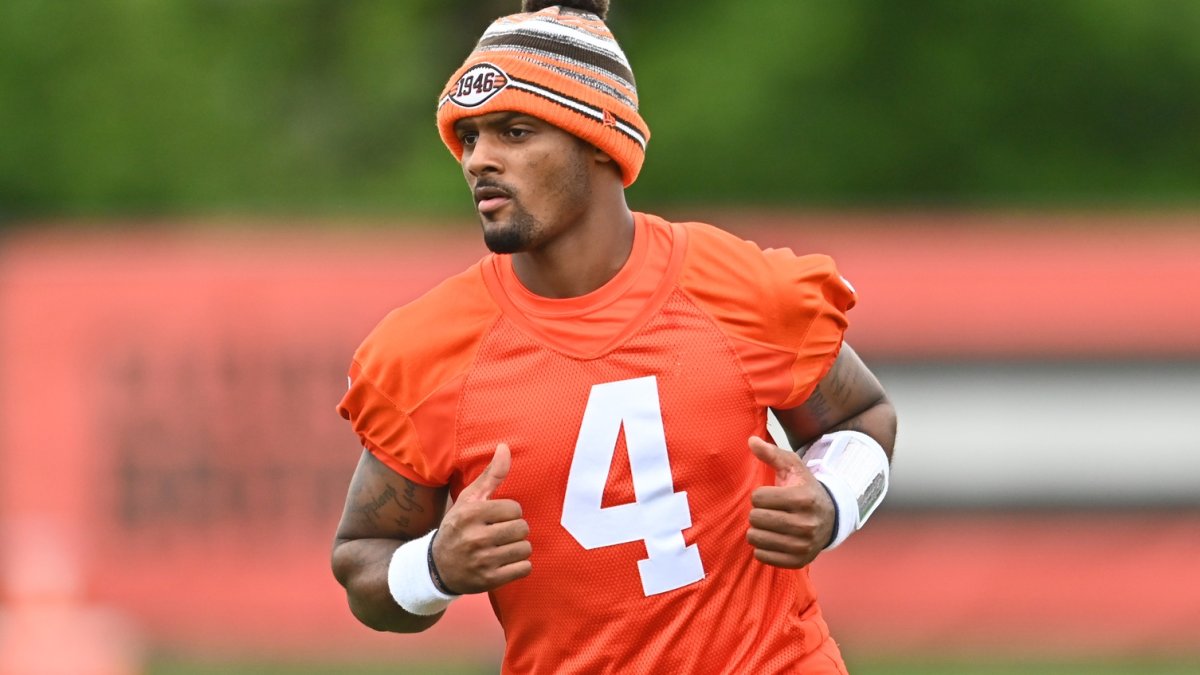• UPDATE: On Aug. 3, the NFL appealed Watson's initial six-game suspension. Under the current CBA, NFL commissioner Roger Goodell has the option to consider the appeal himself or he can appoint a designee to do so. The ruling by Goodell or his designee will be final and binding to all parties.
According to NFL Media’s Ian Rapoport, the NFL’s newly appointed disciplinary officer, former federal judge Sue L. Robinson, has determined that Cleveland Browns quarterback Deshaun Watson should serve a six-game suspension with no additional fine.
In anticipation of the ruling, Watson and the NFLPA released a joint statement announcing they would not appeal the decision, encouraging the NFL league office to do the same. Given the NFL was reportedly pushing for a full season or even indefinite suspension, they may not join the NFLPA in refraining from further action.
The disciplinary officer’s rulings are subject to appeal to the commissioner, and either party may appeal the disciplinary officer’s decision. The commissioner may then choose to reduce or increase the discipline originally imposed by the disciplinary officer.
Even following changes to the disciplinary process in the 2020 collective bargaining agreement, the commissioner still has the final say if the NFL elects to appeal the disciplinary officer’s decision. The NFLPA’s statement may suggest they are willing to take this issue to federal court if an appeal is indeed filed by the NFL.
The NFL has three days to file an appeal and Watson/the NFLPA have two days to respond, after which “the Commissioner or his designee will issue a written decision that will constitute full, final and complete disposition of the dispute and will be binding upon the player.”
With a 2022 base salary of $1.035 million as a part of a revised contract signed this offseason, Watson will lose $345,000 as a result of the suspension. He ultimately saved about $11.3 million with the revision to his 2022 salary from his original contract.
How did we get here?
Attorney Tony Buzbee announced June 21 that all but four of the 24 civil cases pending against Watson had been settled. And Buzbee told ESPN early Monday morning, hours before Robinson’s ruling, that Watson had agreed to settle three of those remaining four lawsuits. The terms of the settlements will remain private, and NFL vice president of communications Brian McCarthy stated previously that “[this] development has no impact on the collectively bargained disciplinary process.”
It is important to note that Robinson only examined four cases, not every accusation against Watson.
Two grand juries found there wasn't sufficient evidence to bring charges against Watson, so why can the NFL still punish him?
First and foremost, a grand jury declining to bring charges is not the same as a court of law declaring a defendant innocent. Nevertheless, the NFL has made it clear that its Personal Conduct Policy can arrive at its own determination of the facts and may fine and/or suspend players absent a conviction of a crime. Former Pittsburgh Steelers quarterback Ben Roethlisberger — accused in 2010 of sexually assaulting a college student following a night of drinking in Milledgeville, Georgia — was the first player suspended under the policy who was not arrested, charged with or convicted of a crime.
Commissioner Goodell’s 2010 letter to Roethlisberger stated he could suspend a player where the league finds that the player’s conduct “imposes inherent danger to the safety and well-being of another person.”
The Personal Conduct Policy also states that discipline is appropriate for conduct that “undermines or puts at risk the integrity and reputation of the NFL, NFL clubs, or NFL players.” The allegations made against Watson undoubtedly fit this description.
Is there anything Watson can do to potentially reduce the length of the suspension?
NFL commissioner Roger Goodell was very deliberate in his letter to Roethlisberger that measures could be taken to mitigate a potential punishment:
“I believe it is essential that you take full advantage of the resources available to you,” Goodell wrote. “My ultimate disposition in this matter will be influenced by the extent to which you do so, what you learn as a result, and a demonstrated commitment to making positive change in your life.”
He took a similar stance with former Chicago Bears interior defender Tank Johnson in 2007, explaining his suspension could be reduced if he avoided legal trouble and attended counseling.
Roethlisberger's suspension was reduced from six games to four games in large part due to his participation in the behavior counseling that Goodell ordered the quarterback to undergo during his suspension. Watson has been adamant throughout the process that he doesn’t need to speak with a professional because he claims he didn’t do anything wrong:
“It's hard for me to say the counseling part because I don't have a problem; I don't have an issue,” Watson told the media at his introductory press conference with the Cleveland Browns following a trade from the Houston Texans. “That's what I've been saying from the beginning. This situation is definitely tough, and it’s very difficult, but me having a problem and going to counseling and things like that? I’m willing to talk to people about certain situations to make sure I’m not getting back into this, but like I’ve said before I never assaulted anyone, I never disrespected anyone. I’ve always been respectful and that’s what I’ve always stood on and that’s who I am as a person.”
Watson may view his stance on counseling as aligning with his consistent declaration of innocence, much like his apparent lack of desire to settle the civil cases brought against him, but based on past precedent, this may work against him with respect to the extent of the league’s discipline.
With the ruling now official, if Watson/the NFLPA believe the punishment is too severe, they may now appeal the decision to the commissioner.
What are the implications of a suspension on Watson participating in games/practices?
While suspended, Watson cannot practice with the Browns nor attend games or publicly represent the team in any way starting Sept. 5. Watson cannot have contact with any member of the coaching staff or personnel/operations department.
Should we expect the NFLPA/Watson’s team to fight back against a potential NFL appeal?
Yes, and the expectation is that they will do so vigorously. Both Mike Florio of Pro Football Talk and Mark Maske with the Washington Post have reported the NFLPA is expected to argue that the disparate treatment of owners — i.e., the lack of punishment for recent off-field transgressions committed by at least three owners — would make a substantial punishment of Watson unfair and hypocritical.
The aforementioned personal conduct policy explicitly states: “Ownership and club or league management have traditionally been held to a higher standard and will be subject to more significant discipline when violations of the Personal Conduct Policy occur.” The NFLPA will likely argue this is categorically untrue if the same personal conduct policy that effectively refused to punish New England Patriots owner Robert Kraft for being charged with solicitation at a massage parlor now hands down a significant suspension and/or fine for Watson.
From a procedural standpoint, it appeared less likely we’d see the Watson team/NFLPA go to court over how the matter is handled, as was the case with Adrian Peterson in 2014, Tom Brady in 2015 and Ezekiel Elliott in 2017. The new NFL collective bargaining agreement, ratified in 2020, created the “Disciplinary Officer” position, stripping this power previously held by the commissioner. However, as previously discussed, the final ruling still ultimately resides with the commissioner, which could be the crux of the issue raised in court.
What is the commissioner’s Exempt List? Will that play a role?
Here's a full description of the Reserve/Commissioner Exempt List directly from the NFL Player Personnel Policy Manual:
“The Exempt List is a special player status available to clubs only in unusual circumstances. The List includes those players who have been declared by the Commissioner to be temporarily exempt from counting within the Active List limit. Only the Commissioner has the authority to place a player on the Exempt List; clubs have no such authority, and no exemption, regardless of circumstances, is automatic. The Commissioner also has the authority to determine in advance whether a player's time on the Exempt List will be finite or will continue until the Commissioner deems the exemption should be lifted and the player returned to the Active List.”
While on the commissioner's exempt list, a player is paid as if they were on the active roster, yet they do not count against their team's 53-man active roster limit. A player on the exempt list is not allowed to practice or attend games, but they are allowed to be present at the facility for meetings, to work out and to receive treatment.



 © 2026 PFF - all rights reserved.
© 2026 PFF - all rights reserved.